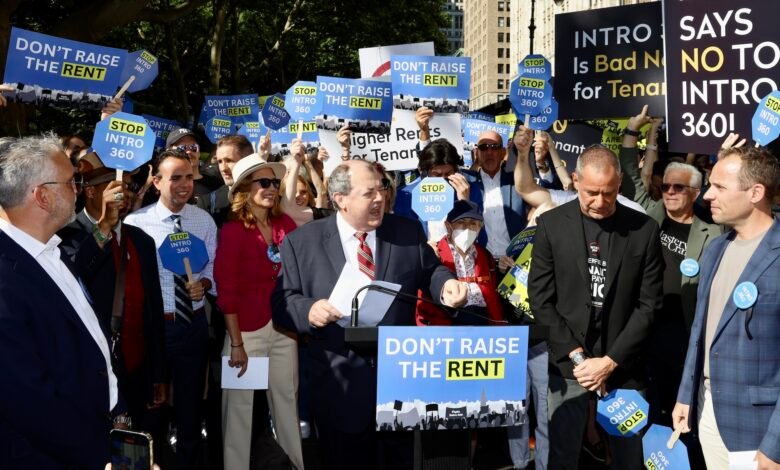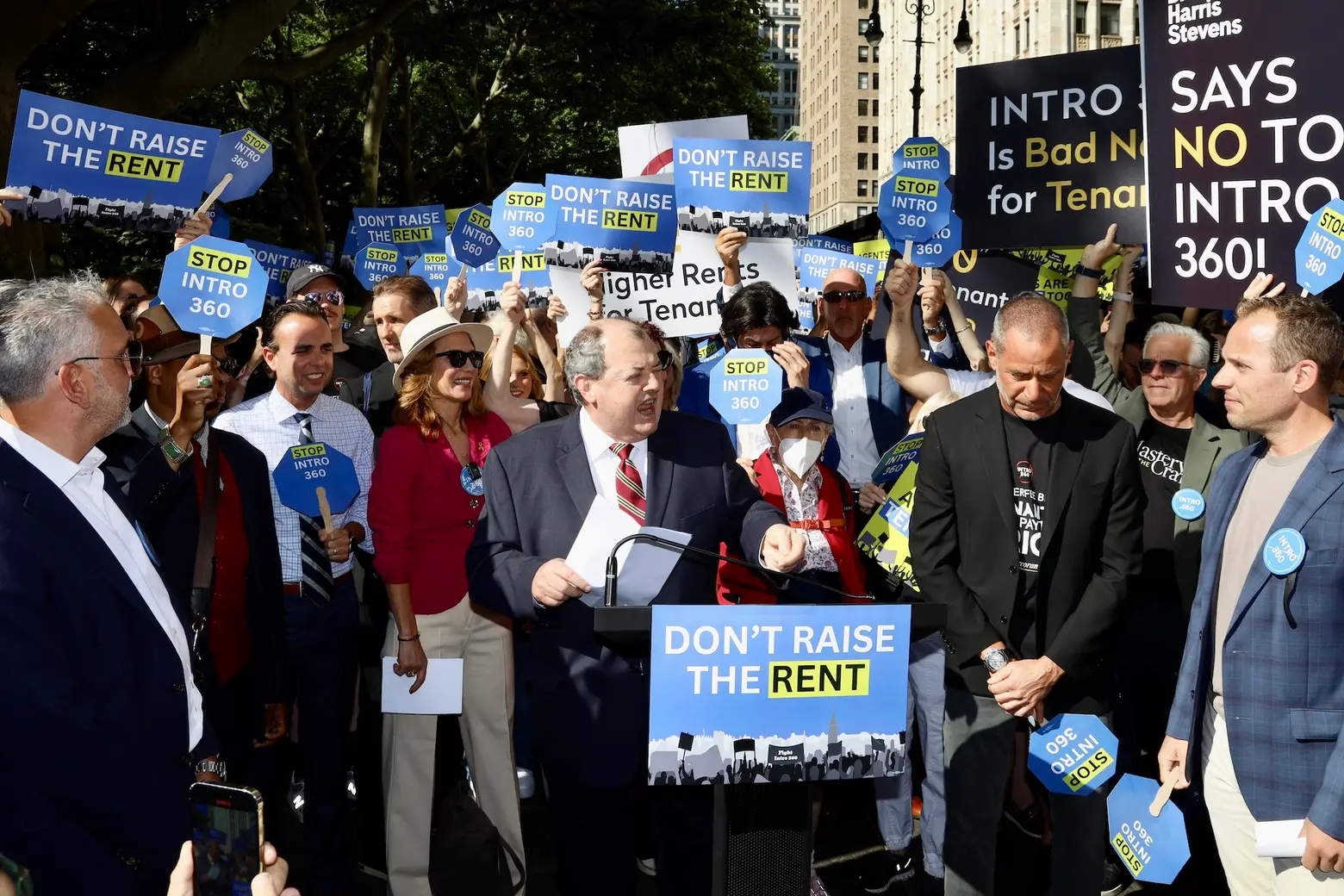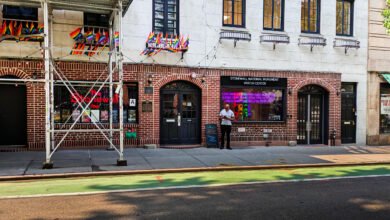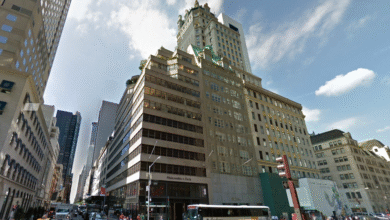What to know about the NYC broker fee bill


James Whelan, President of REBNY, during Wednesday’s rally at City Hall. Photo courtesy of REBNY
Broker fees are once again up for debate in the New York City Council. A seven-hour public hearing on Wednesday brought hundreds of tenant advocates and real estate professionals to City Hall over Intro 360, or the Fairness in Apartment Renal Expenses (FARE) Act. The legislation, sponsored by Council Member Chi A. Ossé, calls for shifting the payment of broker fees to the party who hired the broker, often the landlord or management company. Agents argue landlords would bake the fees into the monthly rent, threatening their livelihood and increasing the financial burden for renters.
What are broker fees?
New York City is one of only two U.S. cities where tenants are charged a broker fee, a one-time, up-front sum prospective renters pay brokers. The fee typically ranges between one month’s rent and 15 percent of the total annual rent, in addition to a security deposit.
As CityRealty notes, if you rent an apartment for $3,000 a month, making the annual rent $36,000, you can expect to pay anywhere from $3,600 to $5,400 in brokerage fees on top of your first month’s rent before moving in.
Currently, the renter is responsible for paying the fee even if the agent is hired by the landlord or building management company. Since no law determines how much agents can charge, the fees are negotiable, although many renters may not be aware of this.
What is Intro 360?
Sponsored by Council Member Chi A. Ossé, the Fairness in Apartment Rental Expenses (FARE) Act would require broker fees to be paid by the party who hired the agents, which often is the landlord or management company. Broker fees would not be capped under the legislation.
“New York City is one of just two major cities in our nation in which tenants are forced to pay the fee for a broker they did not hire. That system is bad for the economy, brutal for renters, and plainly unfair,” the council member said Wednesday.
Ossé, who represents parts of Brooklyn and has detailed his own struggles finding an apartment, introduced the legislation last June and reintroduced it in February. The Committee on Consumer and Worker Protection hosted a public hearing on Wednesday on the bill. While no representative from the Department of Consumer and Worker Protection (DCWP) showed up to testify as of this afternoon (City Hall sent a representative from the Department of Housing Preservation and Development), 400 members of the public, both tenant advocates and brokers, signed up to voice their opinions.
Council Member Sandy Nurse said she was “livid” about the Adams administration not sending a representative from DCWP.
“This administration has wasted our time today. You all knew that many people were going to be here today because this clearly impacts so many New Yorkers,” Nurse said to Ahmed Tigani, HPD’s First Deputy Commissioner, during the hearing on Wednesday.
“I am livid right now. I am a tenant. A lot of people in this room are tenants. We are desperate. And you have come here with nothing to offer.”
Who supports the legislation?
As of Wednesday, the FARE Act has 33 sponsors, a majority of the New York City Council. Brooklyn Borough President Antonio Reynoso, Public Advocate Jumaane Williams, and Comptroller Brad Lander are among other elected officials supportive of the bill.
According to City & State, more than 30 advocacy groups, including the Legal Aid Society, Make the Road New York, and Housing Justice for All, as well as several unions, support the legislation. Venture capitalist Bradley Tusk also testified in support of Intro 360 and said broker fees are an “artificial barrier” to people moving to the city and called them bad for the economy.
“New York City does well because the best and the brightest people all over the world want to come here,” Tusk said during his testimony on Wednesday. “So many of them never make it here because they have to pay this ridiculous broker’s fee.”
Mayor Eric Adams, who previously worked as a real estate agent, has not come out in support or opposition of the bill, but said his administration will look at the legislation. “No one wants to have tenants pay what they shouldn’t have to pay,” Adams told reporters on Tuesday, adding that”real estate agents do a lot of work.”
“We’re going to look at the bill and we’re going to see exactly how it impacts the industry,” he said.
Who opposes the legislation?
The real estate industry hosted a rally in front of City Hall ahead of the hearing, with roughly 1,500 brokers and real estate professionals participating, according to the Real Estate Board of New York. Over a dozen REBNY members testified that the bill would make landlords pass the broker fees onto tenants through higher rents.
“Legislation that will make rents higher, further limit housing access and threaten the livelihood of hardworking agents is legislation that New York City elected officials should be unanimously against,” James Whelan, President of REBNY, said in a statement.
“There are thousands of residential real estate agents that call New York City home and will not stay silent as policies are considered like the FARE Act, which will worsen our housing crisis and potentially put them out of work.”
The group argues the reason behind the high rental prices is a supply and demand issue, claiming the city does not build enough housing.
“Anyone with a simple understanding of economics and a willingness to analyze the data around housing in New York City should understand that costs are growing for renters due to a lack of supply,” Bess Freedman, CEO of Brown Harris Stevens, said.
“The Council should be engaging the industry on solutions to create the 500,000 plus new homes experts agree we need by 2030, rather than trying to shakedown agents who provide valuable services to renters and the City’s economy.”
Deja vu all over again?
Broker fees were banned for a short period in 2020. Under the Housing Stability and Tenant Protection Act signed into law by Gov. Andrew Cuomo in 2019, landlords were prevented from deregulating rent-stabilized apartments and security deposits were capped at one month’s rent. As part of the guidance issued by the Department of State, real estate brokers hired by landlords could not be compensated by the prospective tenant.
Several real estate brokerages sued, claiming this would negatively impact residential agents and tenants. The New York Supreme Court issued a temporary restraining order, halting the extremely short-lived ban on the fees. In 2021, a judge ruled a ban on broker fees was an “error of law” and struck down the law.
In 2019, a bill was proposed to cap broker fees to one month of rent but failed to move forward.
Why is the broker fee bill gaining traction again?
New York City is in the middle of a housing crisis and currently has a rental vacancy rate of 1.4 percent, the lowest rate since the 1960s. For apartments priced below $1,650/month, the vacancy rate is below 1 percent. Rents have skyrocketed to record levels the last year, with the median asking rent citywide at $3,500/month.
According to an analysis last month by Douglas Elliman and Miller Samuel, the median rent in Manhattan was $4,250 in April, marking the third time in four months rent increased year-over-year. That figure was also 27 percent higher than the pre-pandemic average in April 2019, as the Daily News reported.
What’s next?
Wednesday’s hearing is the furthest point the legislation has reached in the Council so far and may result in amendments to the bill. The Committee will then vote on the bill. If it passes by a majority vote, the legislation will move to the full Council to be voted on during a stated meeting.
Members of the public can submit testimony up to 72 hours after the end of the hearing. Do so here.
RELATED:






